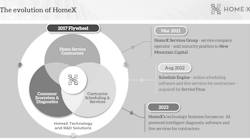The Direct Energy family of service brands—One Hour Heating & Air Conditioning®, Benjamin Franklin Plumbing® and Mister Sparky® — are continuing their partnership with Mike Rowe, creator, executive producer, and host of the “Somebody’s Gotta Do It” and “Dirty Jobs,” TV programs, to highlight the skilled trades industries and the people who work in them.
ContractingBusiness.com spoke with Mike Rowe during the recent national convention for One Hour Heating & Air Conditioning, Benjamin Franklin Plumbing and Mister Sparky, to learn more about his mission to grow trade careers, and how he believes employers can better relate to, and attract, today’s younger workers. He spoke frankly about the various forces that tug at students as they face career choices.
“Parents, guidance counselors and peers are the forces that compel a kid to draw the conclusions they’re going to draw about the nature of a good job in 2016,” Rowe said, “and there have been decades of pressure toward a four-year degree. A university education is a fine thing, and I don’t have anything bad to say about it. If you can afford it, by all means...
“But it’s become so expensive, exponentially, and as so often happens, when you try to promote one thing, it often comes at the expense of something else. And it’s certainly true of education. So, when people promote a four-year degree, as being a great alternative, what they really do is promote it as the best alternative for the most people; and in the context of doing that, they wind up implying that anything less will get you somewhere less. And so, just the weight of that message over time has impacted the way people think about the skilled trades. There are a lot of stigmas and stereotypes that need to be debunked. My foundation does that and this campaign (with Direct Energy) does, too.”
Rowe added that today’s “millennials” needn’t take all the blame for their career confusion, nor for how they choose to spend their time.
“They’re an easy target, and because of that, they take a lot of hits. In my opinion, there’s a responsibility to be shared by all generations, but the youngest generation is always a product of what the prior generations built. It’s not magic,” Rowe said. “The ‘greatest’ generation came from the generation before. Millennials, essentially, took their cue from us.
“When “American Idol” becomes the most popular show in the history of television, or when books like “The Four-Hour Work Week” become bestsellers, it doesn’t matter where you look. Madison Avenue is reminding us at every turn that we could be happier if we work less. This whole notion of ‘a good job’ versus ‘an opportunity’ is something millennials are wrestling with. We’ve basically inculcated in their minds that, ‘there’s always something better for you, so you should not be satisfied with anything less than that.’
“But your odds of finding meaningful employment will be a lot better if you don’t look for your ‘dream job,’ but look for an opportunity that will reward hard work, diligence and expertise. Those things will always be for sale, and they’re for sale in the trades, moreso, in my opinion, than in any other vocation.”
So if a millennial decides to give the trades a try, should an employer bend over backwards to accommodate their desire for a job with all kinds of flexibility and pizzazz?
Perhaps not. First, Rowe says, try some challenging plain talk, to explain what is and isn’t possible in he workaday world. Something like, ‘You can’t get your flex time, but how about getting in on the ground floor of a proven rewarding career? Are you down with that?’
“To me, there’s a difference between saying that, and concluding we’ve gone as far as we can go, and saying ‘this is where we are as a society.’
“How can we challenge millennials without attacking them?’ That’s the trick.”
But choose your approach and your words carefully.
“The key is to make a much more persuasive case for the opportunities that exist,” Rowe says. “If you do that like a typical guidance counselor, you’ll put them to sleep. If you give them a lecture, you’ll drive them away. If you do it like a parent, you’ll scold them. And if we continue to give money away for four-year degrees without focusing on certifications and trade schools, we’re just going to get more of what we’re rewarding.”
But one caution: don’t beg and don’t plead. Issue the challenge.
When the Marines recruit, they say, ‘No, it’s probably not for you.’ They want ‘the few, the proud…’ And when you challenge somebody by saying ‘This might not be for you; it’s going to take real intelligence, and a real work ethic. The benefits are tremendous, but it might not be for you,’ I think that level of honesty still resonates with millennials.
So basically, Rowe’s approach is to have them put away the participation trophies, and face career life knowing it’s all up to them.
“I’m really generalizing, but I think that for so long these kids have been told they’re ‘precious’ in a way that maybe they aren’t. I’m not going to say they’ve been handed things, but they’ve been presented with a version of the world that says, ‘you can be all that you can be.’ Maybe you can, but it’s not going to be because you want it, it’s going to be because you actually pick up a tool that you’ve been trained to use, and you’re going to do something with it.”









